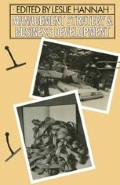Abstract
My view of business history has a strongly ‘political’ tinge to it. That is, I think that in looking at the way businesses develop, particularly those run by large corporations, one is looking at power politics in an economic landscape. Businessmen are often driven by motives which are by no means purely commercial. They seek power. They engage in rivalry. Their rivalries may be personal, or corporate, or both. The plans they make, though presented, for orthodoxy’s sake, as being aimed purely at the maximisation of profits, often have quite other ends in view as well. It follows that in business history, as in political history, we are concerned with the interplay between men and events, and it is equally important to understand both. Indeed I would go so far as to say that without having a pretty good knowledge of the people you are dealing with, you are unlikely to form a sound judgement of the things that have happened in — or to — their companies and their industries.
Access this chapter
Tax calculation will be finalised at checkout
Purchases are for personal use only
Preview
Unable to display preview. Download preview PDF.
Notes
A. D. Chandler and Stephen Salsbury, Pierre S. du Pont and the Making of the Modern Corporation ( New York: Harper & Row, 1971 ).
Charles Wilson, The History of Unilever (London: Macmillan, 1954) 1, ch. 3. For the biography of W. H. Lever, see 2nd Viscount Leverhulme, Viscount Leverhulme (London, 1927).
Harley Williams, Men of Stress (London, 1950) ; Dictionary of National Biography Twentieth Century, 1922–1930 (London, 1937).
Charles Booth, Life and Labour in London 2nd Series, Industry v (London, 1903) 329–31.
Nigel Nicolson, Lord of the Isles (London, 1960).
L. F. Haber, The Chemical Industry 1900–1930 (Oxford, 1971 ), 284.
W. J. Reader, Imperial Chemical Industries, a History (London, 1970) i ch. 19.
Hector Bolitho, Alfred Mond, 1st Lord Melchett (London, 1933).
W. J. Reader, Imperial Chemical Industries, a History (London, 1975) n, 25.
Sir Alfred Mond, Industry and Politics (London, 1927) 9, quoted in DNB art. ‘Mond, Alfred Moritz’.
W. J. Reader, The Weir Group (Weidenfeld & Nicolson, 1971), chs 3, 6, 7.
See also W. J. Reader, Architect of Air Power (Collins, 1968) ch. 6, s and n.
W. J. Reader, Metal Box: a History (Heinemann, 1976 ).
Editor information
Copyright information
© 1976 Palgrave Macmillan, a division of Macmillan Publishers Limited
About this chapter
Cite this chapter
Reader, W.J. (1976). Personality, Strategy and Structure: some Consequences of Strong Minds. In: Hannah, L. (eds) Management Strategy and Business Development. Palgrave Macmillan, London. https://doi.org/10.1007/978-1-349-03051-4_7
Download citation
DOI: https://doi.org/10.1007/978-1-349-03051-4_7
Publisher Name: Palgrave Macmillan, London
Print ISBN: 978-1-349-03053-8
Online ISBN: 978-1-349-03051-4
eBook Packages: Palgrave Business & Management CollectionBusiness and Management (R0)

